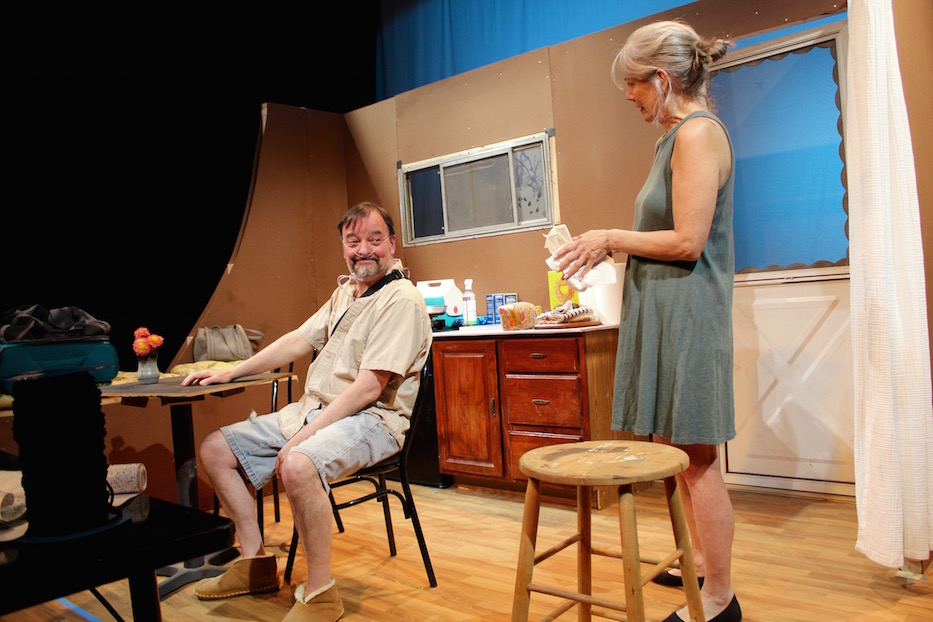
Downtown | EBM Vintage | Arts & Culture | New Haven Theater Company | Theater
.jpg?width=933&name=Annapurna%20-%201%20(1).jpg)
Ulysses (J. Kevin Smith) and his ex-wife Emma (Susan Kulp). Lucy Gellman Photos.
The cowboy-poet Ulysses is testing his memory one sentence at a time. An oxygen tube snakes beneath his nose and over his ears, bobbing with each word. In front of him, his ex-wife Emma stands at the counter, inexplicably present for the first time in decades. She toys with a sweating can of ginger ale in her hand. Over and over again, Ulysses explains what he cannot remember of the night she and his son disappeared.
“All I remember is I woke up and you were gone,” he says. His trailer is a tin can in the summer heat. The rest of the story hangs low in the air, waiting in between their silences.
That world explodes in Sharr White’s Annapurna, opening from the New Haven Theater Company (NHTC) this Thursday at EBM Vintage at 839 Chapel St.. The work, directed by John Watson with a small and nimble cast and crew, is at turns lyrical, harsh, and bitterly funny. Or in Watson’s words, “it’s the funniest play I’ve ever read about a man dying of cancer.”
It marks a triumphant return to the stage for the all-volunteer company, which went dark halfway through its 2019-2020 season due to Covid-19. Performances run at EBM Vintage May 5-7, 12-14, and 19-21. Tickets and more information are available here.
“It’s a reckoning,” Watson said at a recent rehearsal. “For me, this is a story about ‘Why do we care for each other, even though we’re relentlessly imperfect?’”
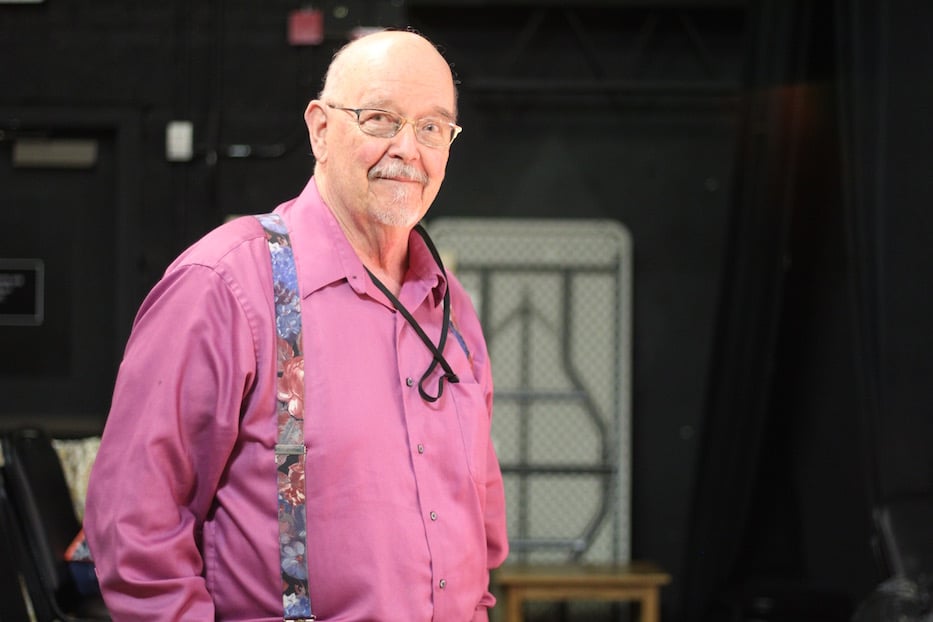
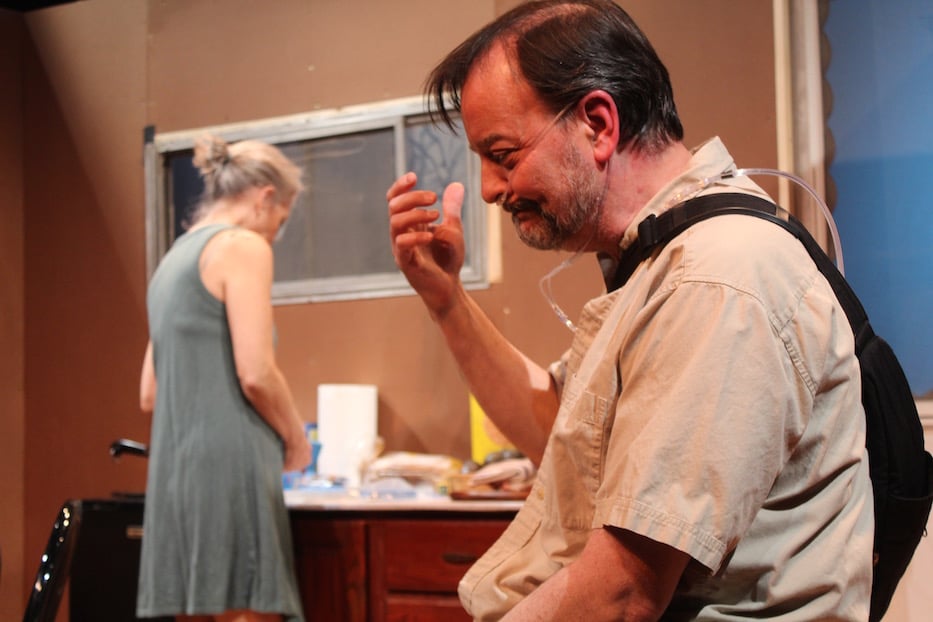
Director John Watson: “It’s a reckoning."
Written in 2013 and set in small town Paonia, Colorado, Annapurna follows Ulysses (J. Kevin Smith) and his ex-wife Emma (Susan Kulp) as they reconnect unexpectedly in his mobile home two decades after she has fled with their son. At the doorway, Emma barrels in as if she has never left, multiple suitcases and a wad of cash in tow. Outside the window, Mt. Gunnison rises in the distance, its white-capped peak touching the sky. Another mountain—the Nepalese giant Annapurna—is never far from Ulysses’ mind, for reasons that become clear as the work unfolds.
Inside, his life is collapsing as the Colorado summer rages on. There’s rank, botulism-swollen sausage in his fridge, dwindling disability benefits on which he gets by, and a royalty check coming that won’t be more than $12. The kitchen floor and counters teem with small black ants. His years of drinking and smoking have caught up to him, and cancer is blooming through his body. When he walks onstage in a prim, printed cotton apron, oxygen tube and very little else, the audience gets an acute sense of just how much of a mess he has become.
His literary namesake—Ulysses is the Roman version of Odysseus, and also the title of James Joyce’s Homeric riff turned sprawling modern masterpiece—becomes as fitting as it is ironic. While Ulysses never leaves the 14 or so feet that make up a messy mobile home, Emma’s visit sets him on a great and jarring psychic journey. That there is also a final, epic poem about his spiral into ruin and the magnificent woman who put him there doesn’t feel like a stretch in White’s able hands.
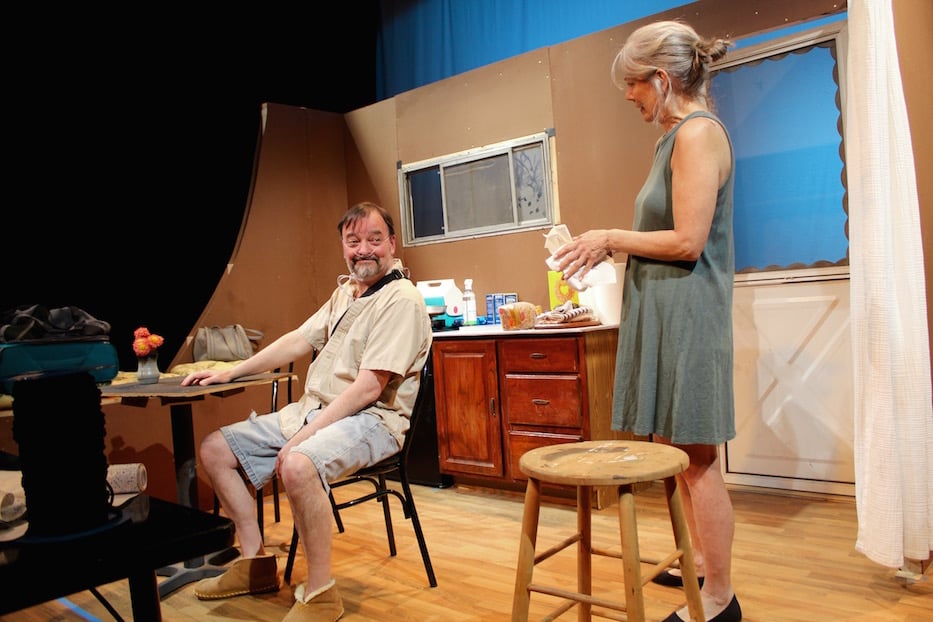
So much of the play is woven into White’s dialogue, and Smith and Kulp slip into it with a humming, barbed chemistry that keeps the work moving forward. Through conversation, the audience learns that Ulysses was once a nationally recognized poet, for whom Emma was both editor and muse. Five years into their relationship, she left with their son, Sam. Now, decades of history are crumbling before their eyes. Sam is on his way back to his father, and she’s there to soften the blow.
As the two volley sentences back and forth, their words take on a rhythm that belongs as much to Emma as it does to her ex-husband, pulling a curtain back on history, memory, and grudging forgiveness. The longer Emma remains in Ulysses' mobile home—the work takes place over a single day, although it sometimes feels much longer—the more questions the audience has about how people reconcile, how they apologize, and how they remember. White’s ear for language is crisp and economical, and Smith and Kulp take it in stride.
“How do you know how it all goes?” Emma asks at one point, when Ulysees has tried to present his version of history.
“‘Cause I do!” he answers, and for just a moment, it feels like enough.
On stage, Kulp and Smith step into White’s world as though they have been waiting, quietly, to take on these roles for a lifetime. While Kulp could go for anger—Emma has a lot of it—she chooses a much more nuanced, simmering sort of frustration, legible in the lilt of her voice, her fidgeting hands, the close-to-twitching muscles on her face. Her rage is measured, quiet, but never subdued, and she recognizes its power as the play unfolds in this small, cramped space that holds decades of spoiled memories.
Smith, in turn, is a rough-edged and surprisingly humorous Ulysses who leans into the character’s deep, if sometimes blunted, humanity. In a conversation that unfolds in stages (props to a straightforward, functional lighting design that uses blackouts as pauses), the audience watches Smith struggle with a history of substance use disorder until they are second guessing what they understand of it themselves. Like Kulp, Smith has a particular talent for physical acting, showing as much in his big, wet eyes and perennially slumped shoulders as he does in speech.
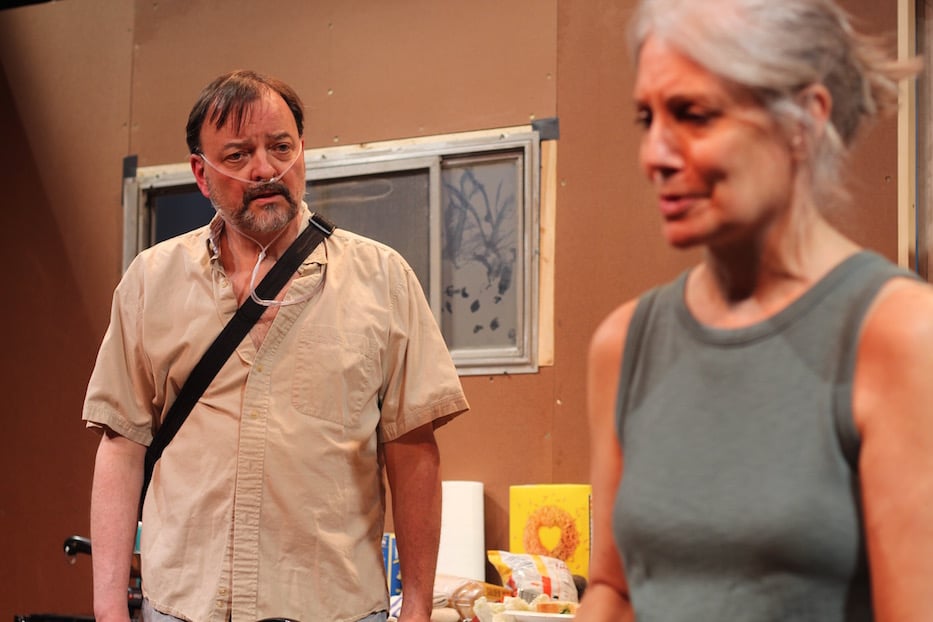
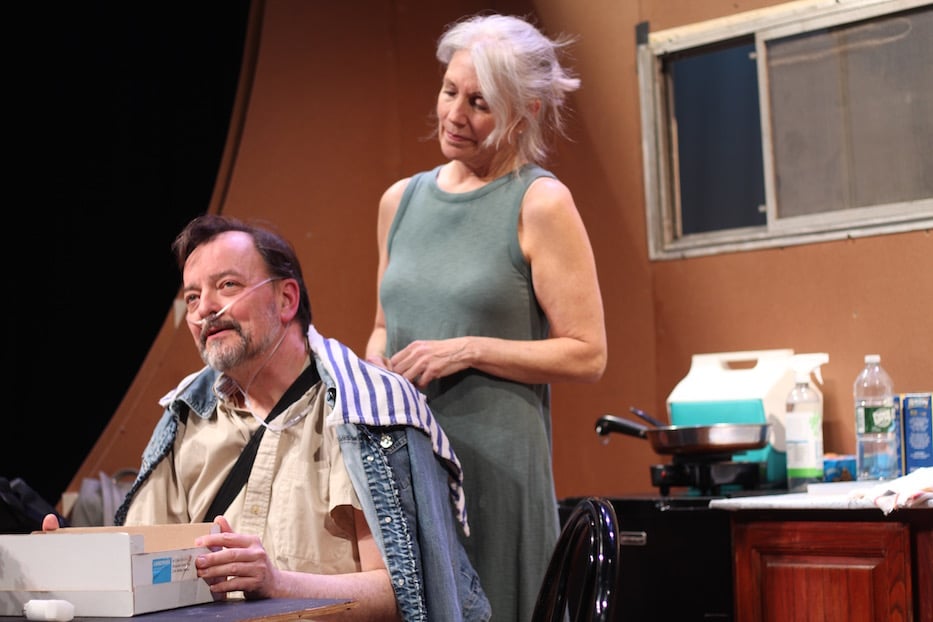
The show feels just the right degree of intimate in EBM’s extra room-turned-blackbox theater, small enough that there is not a bad seat in the house. Working behind the scenes, Brian Diaz (set construction) and Donna Glen (set decoration) have built the right container for the play. Diaz’ trailer is claustrophobic, but it’s supposed to be—this whole work is about the way history catches up with people. There’s a sense of the mountains rising outside, of Ulysses taking stock of his life in this small, rugged Colorado town, of the mangy dog with a human name running laps right beneath the kitchen window.
After two years away, actors carry it carefully, with the sense that it’s a gift to be back. Annapurna may have been written before the pandemic, but the splintered and gasping relationship at its core makes it feel incredibly timely. Watson, a “retired” public defender who now works with the Connecticut Innocence Project, said he’s thrilled to be directing it. He fell in love with the script the first time he read it years ago. In planning their season, company members voted unanimously for it to be the opener.
He’s not the only one. At a recent rehearsal, both Smith and Kulp jumped into White’s world, excited to be back on the stage. When they emerged over 90 minutes later, both looked as if they'd run an emotional marathon.
“When I first read the play, I could hear the character’s voice in my head,” said Smith, whose Ulysses is so gruff and no-nonsense that even his whisper has a five o’ clock shadow. “It’s just an amazing piece of work.”
The New Haven Theater Company’s performance of Annapurna runs at EBM Vintage at 839 Chapel St. May 5-7, 12-14, and 19-21. Tickets and more information are available here.

